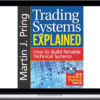Martin Pring – Market Analysis Companion for Metastock
Description of Market Analysis Companion for Metastock
Detailed explanation and information to analyze the U.S. stock market for better trading results.
Including:
10 movie tutorials using marketplace examples of specific indicators such as the A/D line, McClellan oscillator, high/low indicators, volume.
Over 70 chart arrangements to make it easy for you to plot and customize the indicators discussed in the tutorials
9 presentations.
About Martin Pring
Martin Pring entered the financial markets in 1969 and has grown to become a leader in the global investment community. In 1981 he founded Pring Research, and began providing research for financial institutions and individual investors around the world. Since 1984, he has published the “Intermarket Review”, a monthly market review ering a long-term synopsis of the world’s major financial markets. Martin pioneered the introduction of videos as an educational tool for technical analysis in 1987, and was the first to introduce educational, interactive CD’s in this field.
Demanded as a speaker worldwide, he is the author of several outstanding books including, Introduction to Technical Analysis, Martin Pring on Market Momentum, and Technical Analysis Explained, now in its fourth edition. Since this unique book first appeared in 1979, Technical Analysis Explained has established itself as the number one guide of its kind. It is used by several international technical societies for training and is one of the three main books for Level 1 CMT certification for the Market Technicians Association.
Translated into over 10 languages, the book is, as quoted in Forbes, “widely regarded as the standard work for this generation of chartists”. According to Futures Magazine “it is one of the best books on technical analysis to come out since Edwards & Magee’s classic text in 1948…belongs on the shelf of every serious trader and technical analyst.” It has become the text on which other works in the field have been based.
In 2002, McGraw-Hill released six new Pring titles, Technician’s Guide to Day and Swing Trading, Breaking the Black Box, Introduction on Candlestick Charting, How to Select Stocks and the two-volume set, Momentum Explained. In 2004 his latest book Martin Pring on Price Patterns was published. A further volume on asset allocation, intermarket relationships and ETF’s will be published in the summer of 2006.
Described by Barron’s as a “technician’s technician”, Martin’s articles have been featured in Barron’s, and he has been quoted in The Wall St. Journal, International Herald Tribune, The New York Post and Los Angeles Times newspapers and the National Review.
He is currently writing a monthly educational column on the basics of technical analysis for Stocks and Commodities Magazine. He is widely acclaimed by his peers and has received the Canadian Technical Society’s Jack Frost Memorial Award as well as the MTA’s coveted Annual Award. He has also been made an honorary member of the Swiss technical Society.
Over the past 34 years, his research has led to the development of reliable financial and economic indicators for timely and effective forecasting. Martin’s personal Barometers for the Bond, Stock and Commodity markets have identified major turning points since the 1950’s on a timely basis and have outperformed the buy/hold approach by a wide margin.
For many years, Martin’s primary interest has been educating students of technical analysis in the basic and finer points of this art. He enjoys mentoring students of technical analysis from the college level to professionals already in the field, sharing the wealth of knowledge he has gained through his own experience and research. In this regard, he has spoken on technical analysis to the Darden Business School, Golden Gate University, and University of Richmond, VA.
He is also chairman of the Pring Turner Capital Group a conservative money management firm dedicated to allocating assets according to business cycle conditions.







